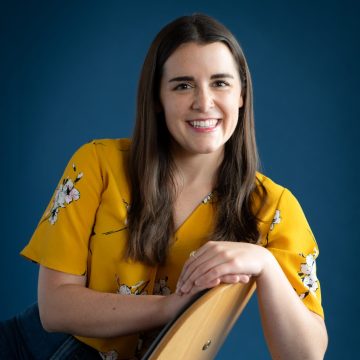Story
Creative Development: Deanna Cummings
A major innovator in Minnesota’s creative economy, 2007 Bush Fellow DeAnna Cummings has spent nearly 20 years building Juxtaposition Arts and the North Minneapolis community that surrounds it.
DATE
December 22, 2019

By Laura Billings Coleman
Photography by Thomas Strand
Seven years ago, DeAnna Cummings took a hard look at the high-traffic, under-resourced intersection in North Minneapolis where she and her husband Roger had planted their business, Juxtaposition Arts (JXTA), and realized the view still needed some improvement.
“When we looked out the window at West Broadway and Emerson, we asked ourselves ‘is the community getting better?’ In some ways the answer was yes, but in lots of ways, it was no,” says Cummings.
Securing a permanent home for the once nomadic arts group had been a long-time dream the couple started in 1995 with their partner Peyton Russell (BF’12). But now the expanded programs they’d once imagined in their new three-building complex didn’t seem to be generating enough impact for people within their immediate community — or showing the big results that mattered to investors and partners. While the pair could point to plenty of success stories among the thousands of teens who’d taken part in their after school arts programs, they couldn’t ignore the growing joblessness, widening achievement gap and dwindling opportunities they saw for the youth of color outside their doors.
“I knew what I needed was to step away from the work and to see it from another angle,” says Cummings, who has served as JXTA’s executive director since its start, while Roger Cummings is the organization’s artistic director. But with two children in school and two incomes now tied to the organization’s survival, “The time was just never going to be there.”
That’s when Leah Lorraine Nelson, a 2006 Bush Fellow and friend, challenged her to think about applying for a Bush Leadership Fellowship, a program Cummings wasn’t sure she was qualified for, having discontinued her undergraduate studies to start Juxtaposition. She made a nervous call to Martha Lee, Bush Fellowship Program manager, and asked if the Foundation ever paid for Fellows to go back to college. Lee admitted it was a long shot, but then asked Cummings if she’d consider setting her sights a little higher.
“Martha said, ‘I suppose you could go back and finish that degree, but with the work you’ve done already, I bet you have bigger dreams for yourself,’” Cummings says. Lee suggested she learn more about one of the few graduate programs in the country willing to consider nontraditional students like Cummings — Harvard’s Kennedy School of Government. “The website had a splash page that said ‘Come Change the World,’ and I remember I just sucked in my breath and dove into every word, because it was like they were talking right to me.”
Today, DeAnna Cummings looks out the windows of Juxtaposition’s gallery space on Emerson Avenue and likes what she sees — a busy commercial corridor bustling with people and vibrant new businesses. Since JXTA put down roots, nearby blocks have benefited from nearly $47 million in new investments. The business itself has also been remodeled with the launch of JXTALab, a teen-run design firm viewed as a national model for everything from youth jobs training to creative place-making. The now four-building campus hums with activity, as students work on client projects that range from screenprinting to environmental design, and adult artists fill a new studio co-op on West Broadway.
JXTA’s shift toward social entrepreneurship has brought in new revenue and measurable results: High school graduation rates in North Minneapolis hover near 50 percent. But for the students who’ve made a two-year commitment to consistent JXTA training, the rate is nearly 100 percent. Fueling JXTA’s plans for the future is a Bush Prize for Community Innovation, a new grant initiative that recognizes organizations with a culture of innovation by providing grants equal to 25 percent of their last fiscal year budget, up to $500,000. For JXTA, that means more than $150,000 of unrestricted creative capital it can reinvest in North Minneapolis and beyond.
“One of my core beliefs is that if you give young people the resources and opportunities, they’re going to reach just as high as you set the bar, and the same was true for me,” says Cummings. “Nearly everything we’re talking about today was buoyed and accelerated by the investment the Bush Foundation made in me, and in my development as a leader.”
Now before we go on, DeAnna Cummings wants to make sure that this article does not conform to the expected standards of the female nonprofit executive profile. “You know — the kind of story where it’s all about being the benevolent giver, and staying in the background,” says Cummings. “I think that’s not the healthiest way for us as women to approach our work.”
Cummings gives credit for JXTA’s growing profile to its staff of talented professional artists and designers. (“Truly, the best people in the Twin Cities.”) She also praises the hundreds of area teens who have worked on the JXTA team over the years and whose creative work and community-building around North Minneapolis prove the organization’s case that youth are the neighborhood’s “greatest asset — not some problem to be solved.” But after nearly two decades as JXTA’s top administrator, Cummings can also take credit for keeping the nonprofit thriving.
“It’s important for me to say out loud ‘I am the CEO of a million dollar business that I started when I was 25 years old.’ But if you stop by JXTA you will hardly ever see me. I’m in my office, or in a meeting or writing somebody about something we’re working on. What you’ll see are the young people, the artists, the artwork — the magic that happens at JXTA. Hundreds of people have contributed their gifts and talents to transforming the vision of an afterschool arts program into an institution that has made a difference for people and this place. That’s something I am incredibly proud of,” says Cummings, who tweets as @MizzBossLadyDee. She adds that earning a Bush Fellowship was no guarantee of success. “It’s a wonderful recognition of your accomplishments and potential, but your problems don’t magically go away. In fact, the challenges get bigger — just like the expectations.”
One of the challenges Juxtaposition Arts faced in 2007 was figuring out how to move beyond what Cummings calls a “buffet-style” set of arts programs and toward higher-dosage efforts that could engage youth year-round, with hands-on opportunities to create and build career skills. “I believe that in a 21st century, new millennium society, artists and arts organizations have to get off of our pedestals and get over the idea that we’re precious,” she says. “Sitting high above everyone and producing pretty objects isn’t going to cut it anymore, if it ever really did.”
Exploring how artists can drive relevant change in communities was a question that made her “a bit of an odd duck” amid the policy wonks at the Kennedy School, where Cummings began her Fellowship studies in 2008. Husband Roger examined many of the same questions from a design perspective (artist as planner/developer/innovator/incubator) as he pursued a parallel inquiry at the Harvard Graduate School of Design with a prestigious Loeb Fellowship in Advanced Environmental Studies. “With a mural, once you get it down you have to relinquish it to the community, and that’s sort of the approach we’ve had with JXTA,” says Roger Cummings. “In the beginning we had no intention of building an institution. We were looking for short-term, concentrated interventions that worked. As it turned out that’s the formula for how to build an institution.”
By the time they and their two kids returned to the Twin Cities in 2009, the couple had come up with a new strategic plan for JXTA designed to take advantage of the high concentration of youth under 18 in North Minneapolis, while taking aim at the low representation of minorities in the Twin Cities’ nationally recognized advertising, arts and design sectors.
“We restructured our program to leverage those realities and accomplish more equitable access to resources and opportunities for youth and emerging artists in North Minneapolis. Today, JXTA is a teen-staffed art and design firm, where youth are employed part-time year-round and produce real products,” from custom t-shirts, to marketing logos, to business signage, to public art, and community engagement. “So now we’re employing kids, bringing in revenue, training them up with job skills and preparing them for higher education,” explains Roger Cummings. The shift in strategy has resulted in a 10-fold increase in JXTA’s reach in nearly every measure, from weeks of programming to annual operating budget, to percentage of revenue earned from client jobs.
An organizational revamp like JXTA’s is unusual in the arts world, says Laura Zabel (BF’14), executive director of Springboard for the Arts. “But DeAnna is one of those leaders who never gets confused about whether her job is to make change or run an organization. She is a national expert in this field, yet she’s always open to new ideas and new thinking.”
“DeAnna is really creative, but she’s very practical, too,” says Erin Jerabek Heelan, executive director of the West Broadway Business and Area Coalition, which has worked closely with both Cummings on projects to improve the economic vitality of the West Broadway commercial district. “When everyone is brainstorming in the clouds, DeAnna can take an amazing idea and figure out how to make it work on the ground.”
Though Cummings knew little about the complicated financing necessary to redevelop the four-property parcel that is now home to JXTA, her “tenacity and openness to learning” was one of the reasons the Nonprofit Assistance Fund helped the organization purchase the corner, says executive director Kate Barr. “She works unbelievably hard, which is a great thing but also something you worry about with leaders, because you realize they can’t sustain that forever,” says Barr. “DeAnna realized that, too, and so one of the things that impresses me about her is that at the same time her organization has been growing, DeAnna has been on a parallel track where she’s been learning about herself and her own leadership strengths. I would say that she’s become more certain about what she wants to do, and more assertive about what she can’t take on.”
But one thing Cummings always makes time for is mentoring the next generation of leaders in North Minneapolis, says community organizer Roxxanne O’Brien. “I met DeAnna when I was 14, and I was one of those young people who was always getting into trouble. I never signed up for a JXTA program, but I’d always drop in because there was this good artist energy there, and DeAnna was always the first person to come out of her office and say hello,” O’Brien says. Cummings encouraged O’Brien to go to college while she worked to raise three kids, and mentored her toward pursuing her own Bush Fellowship in 2013. “It touches my heart to think of the way DeAnna has had a domino effect for other black women. With JXTA, she and Roger have made a light, showing people that you can create something beautiful with just an idea, just a spark. When I see her doing this, it shows me that it can be done.”
Cummings says, “I want people to say about me that everyone who’s worked for me and worked with me is better for it. I want to draw out the best in people so much so that people are beating down the door to work with me and to further where they’re trying to go in life.”
Showing other women their leadership potential is one reason Cummings agreed to join the Bush Foundation’s Board of Directors this spring. “At one point in my life, I might have thought ‘I’m not a leader because I don’t look like my idea of what I thought a leader should look like.’ I’m not always completely buttoned down, and I talk a lot and sometimes too much. But I think when I got a Bush Fellowship, there were people in the world who said, ‘Hey, if DeAnna is a Bush Fellow, maybe that means I can be a Bush Fellow, too.’ That’s the part of my life I’m ready to step into now, sharing what I’ve learned about honoring your history, and owning and using who you are and everything you’re made up of in service of your work and in trying to make a difference in the world.”
DEANNA CUMMINGS in Five
When I was a kid, I thought I’d grow up to be:
A librarian. I’d wake up early in the mornings in the summers during grade school and middle school so I could get dropped off at our local library branch in Kansas City. I’d read a book a day, sometimes more, from the time I started reading when I was four or five years old until I was in high school. I actually had a job in high school working in the school library at South High.
Best advice I ever got:
“Don’t tell people what you think they want to hear. Tell them the truth.” John Spokes, the co-founder of the former Eye of the Storm Theater, once told me that many fundraisers are not successful because they spin their stories, try to say the right thing to get the funding. He told me that you get better results when you just tell the truth.
Things that tick me off:
Inequality, self-important people, all-isms, xenophobia, cheapskates who want to itemize a shared check — can we just split it?!
People might be surprised to find out:
I’m a natural introvert (I just play an extrovert at work), so I need time alone to balance out all the being-with-people I do in my day-to-day life.
My mantra:
“There is no one right way.” That is one of the things I find so fulfilling about working in the arts. A group of artists can all have the same assignment and each will approach it differently. In the end the varied approaches and results can be equally right and impactful and beautiful.
Continue reading
-

News
Opportunity to work with us
As part of our office move later this year, we are exploring possibilities for the build out of the ground floor of the building. We are in the early stages of this and considering different types of operating models and potential partnerships.
-

Staff note
Coordinating the work of our contact hub
We aim to be radically open in all that we do, and that includes being more accessible to more people and sharing what we learn along the way.
-

Staff note
Making every dollar work through impact investing
We have benefitted from the experience of other funders as we developed our impact investing approach. Now we are paying it forward and sharing what we have done and what we have learned.